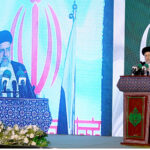By Abdul Shakoor Khan
QUETTA, Dec 04 (APP): Rapid population growth and dwindling education facilities in the public sector provided ample room for the growth of private-sector educational institutions during the last three decades.
On-the-ground infrastructure of educational institutions in the country was quite sufficient to meet the needs of students during the 1980s when the country’s population was around 84.253 million (1981 census). But, it grew to around 132.352 million in 1998 and 207.68 million as per the 2017-18 census exerting extreme pressure on public sector institutions.
In the 1980s, a small number of students used to study at private schools but the coming years witnessed a mushroom growth of the private sector making it a lucrative business in wake of the increasing population, and many major chains surfaced on the horizon. However, the ongoing inflation and hefty fees charged by the private schools had landed parents in Balochistan in real trouble like millions of others across the country.
“I am the symbolic father of 4000 children, and unless you waive off the fee of all of them I will not leave my just struggle to drag the school business mafia to court,” Mohammad Aslam Rind, former Nazim and famous social worker of the Quetta city said narrating his strives. “I shall keep struggling against them until they stop hounding parents for charging hefty fees even during annual holidays.”
He claimed that authorities seemed helpless against the big and branded private school chains. “It seems like only the parents’ headache to fight back these giants minting money for their vested interest.”
Cognizant of the situation, the Supreme Court had also directed to increase annual fees only under the law stating, “education is not a product which can be put up for sale.” Although this verdict had shown some ray of hope to parents yet different loopholes in the system kept hindering on way to its implementation.
The audit report of the Auditor General of Pakistan, prepared on account of 21 private schools in 2018 and submitted to the Supreme Court also disclosed that private schools in question had increased the fee not because of inflation but to benefit the owners.
“How could you deprive students of taking annual exams, if parents could not pay a double fee,” Abdul Razaq Shaikh, a local journalist told his recent experience when his three kids studying in the missionary school were barred from sitting in exams on the pretext of non-payment of their two months fee.
Shaikh claimed that his three kids studying in the country’s big brand known for its welfare schooling system were barred from taking exams as he was late to deposit two months’ Nov-Dec fee. “There is no check on them, how could they charge two months’ fees at a time? They should be asked to abide by laws.”
The issue is getting chronic as in absence of quality education imparting institutions in the public sector, the private institutions exploit parents by charging massively. In some cases, they also either stop students from taking exams or issuing their result certificates if even there is a minor discrepancy in fee payment.
Abdul Rasheed, a WASA lineman in Quetta has also complained about high fees. “Monthly school fee of my five children is over Rs 20,000. Then there are Rs 10,000 school van charges. How can I afford it with a meager salary.”
When asked Abdul Rasheed, why he used to get his children admitted to a private school, his answer was almost the same as that of millions of other parents. “If the education standard deteriorates at the government schools then what is the other option than to approach private institutions.”
Zahoor Elahi, another government employee had the same story as he had to shift his children to the government schools to save the fees money to meet other needs like rations, clothes, medicines, and utility bills.
“How could I spend Rs 35,000 every month on the education of my four children out of my total Rs. 70,000 salary. So, I shifted my children to government schools.”
When people have to make choices between education, healthcare, food, and other essentials, they sacrifice education as living without eating and wearing could not be possible. This trend develops a clear divide between the rich and the poor and many shining students of poor families are deprived of quality education due to paucity of funds.
When asked, the private school owners give multiple reasons to justify the fee hike. “Situation after COVID had changed. Since prices of all commodities had gone up, we had to raise fees to pay salaries and meet other requirements of our institutions,” said Parveen Rehmat, Principal of St Francis Grammar School Quetta.
Even if her opinion is validly considered, still there could be room to facilitate students if they compromise on their profit ratio. But, unfortunately, people have made this missionary a lucrative business for earning money.
Commenting on this situation, Director Education Abdul Wahid Shakir said there are 15089 public sector schools in Balochistan catering to the needs of 1,004,242 students while 327,000 students are enrolled at 1230 private institutions registered under Balochistan Education Foundation (BEF).
“The BEF has formulated BPEIRRA to regulate these institutions. The BPEIRRA is formulating rules and we hope to resolve this issue in near future,” he said.
Parliamentary Secretary of Law and Parliamentary Affairs, Dr. Rubaba Buledi regretted the delayed implementation of relevant laws but was confident to overcome discrepancies in the fee structure.
“The parliament has framed laws and formed the Authority. We are ensuring early implementation of these laws to provide respite to parents.”




